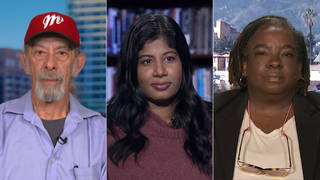
On Thursday, New York City Mayor Bill de Blasio announced a new contract with the United Federation of Teachers. The tentative $4 billion, nine-year agreement ends a bitter five-year conflict between the city’s teachers and City Hall. “All that was needed was a little respect, some novel thinking and genuine cooperation between labor and management,” writes Juan González in his column in the New York Daily News. “That’s the main message we should take away from the new labor pact the de Blasio administration reached this week with the United Federation of Teachers.”
Transcript
AMY GOODMAN: This is Democracy Now!, democracynow.org, The War and Peace Report. I’m Amy Goodman.
JUAN GONZÁLEZ: And I’m Juan González. Welcome to all of our listeners and viewers around the country and around the world.
AMY GOODMAN: Well, Juan, your piece yesterday and today in the New York Daily News, key to finally getting it done: respect.
JUAN GONZÁLEZ: Yes, well, the—most people have heard by now that the New York City teachers’ union negotiated a landmark agreement with the de Blasio administration this week where 100,000 members of the union, after going four-and-a-half years without any pay raises or without a contract, have reached a new contract with the city. And it’s really a landmark agreement, considering the bitterness that has existed between not just the teachers, but all the city unions, who have been without contracts dating way back into the last years of the Bloomberg administration. So it’s going to be a huge change.
I think as the—the respect issue, which I raised in my column, I think was the key to it, that the—that not only the teachers, but all the other unions in the city, for the first time now have a mayor who’s actually respecting the collective bargaining process, treating them as equals, sitting down to try to negotiate how best to deal with the education system and with the wages of the workers in the city. So I think that the willingness of de Blasio to give and take with the unions, some innovative ideas about cutting huge amounts of the cost of healthcare insurance for city workers, made it possible for—
And also, the other thing which I raised, most people are not aware of, New York City’s tax revenues are booming. Just in the first four months of this year, the city was running $700 million over projections on its taxes, largely because of the great year that Wall Street had last year and all the big bonuses that came due this year. So, suddenly, the city is finding itself flush with unexpected money. So not only was Bloomberg willing to negotiate with the unions, he now has—I mean, with de Blasio willing to negotiate with the unions, he now has money that he didn’t have previously. And so they were able to work out 18 percent increases for the teachers over nine years. Now, half of that has already passed, so it’s really only—
AMY GOODMAN: It’s retroactive.
JUAN GONZÁLEZ: It’s retroactive, and then another four-and-a-half years in a future contract. And a whole host of other reforms, over teacher evaluations and over how you—how you fire teachers that have committed misconduct, were all dealt with in the contract. And so, even the business community is lauding the mayor because he was—he managed to do the retroactives, but spaced them out over future years so the hit to the city’s budget is not that great immediately.
AMY GOODMAN: As the rest of the country looks at the de Blasio administration as a—really as a kind of weathervane for things to come, whether a progressive agenda can succeed.
JUAN GONZÁLEZ: Well, I think the main thing to understand is, in most places around the country, unions are giving back stuff. They’re not getting increases, and they’re forced to being—to pay more higher co-pays for their health insurance. This has not happened in this situation. So it is possible to do it when you use creativity and when labor and management cooperate in a respectful tone.












Media Options